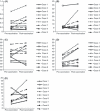Vaccination with peptides derived from cancer-testis antigens in combination with CpG-7909 elicits strong specific CD8+ T cell response in patients with metastatic esophageal squamous cell carcinoma
- PMID: 20874827
- PMCID: PMC11158191
- DOI: 10.1111/j.1349-7006.2010.01732.x
Vaccination with peptides derived from cancer-testis antigens in combination with CpG-7909 elicits strong specific CD8+ T cell response in patients with metastatic esophageal squamous cell carcinoma
Abstract
Potent helper action is necessary for peptide-based vaccines to efficiently induce antitumor immune responses against advanced cancer. A phase I trial for advanced esophageal squamous cell carcinoma was carried out for patients with HLA-A*2402 using epitope peptides derived from novel cancer-testis antigens, LY6K and TTK, in combination with CpG-7909 (NCT00669292). This study investigated the feasibility and the toxicity as well as induction of tumor antigen-specific immune responses. Nine patients were vaccinated on days 1, 8, 15, and 22 of each 28-day treatment cycle with peptide LY6K-177, peptide TTK-567, and CpG-7909 (level-1; 0, level-2; 0.02, level-3; 0.1 mg/kg) and all were tolerated by this treatment. LY6K-specific T cell responses in PBMCs were detected in two of the three patients in each level. In particular, two patients in level-2/3 showed potent LY6K-specific T cell responses. In contrast, only two patients in level-2/3 showed TTK-567-specific T cell responses. The frequency of LY6K-177 or TTK-567-specific CD8+ T cells increased in patients in level-2/3 (with CpG). The vaccination with peptides and CpG-7909 increased and activated both plasmacytoid dendritic cells and natural killer cells, and increased the serum level of α-interferon. There were no complete response (CR) and partial response (PR), however, one of three patients in level-1, and four of six patients in level-2/3 showed stable disease (SD). In conclusion, vaccination with LY6K-177 and TTK-567 in combination with CpG-7909 successfully elicited antigen-specific CD8+ T cell responses and enhanced the innate immunity of patients with advanced esophageal squamous cell carcinoma. This vaccine protocol is therefore recommended to undergo further phase II trials.
© 2010 Japanese Cancer Association.
Figures



Similar articles
-
Detection of novel cancer-testis antigen-specific T-cell responses in TIL, regional lymph nodes, and PBL in patients with esophageal squamous cell carcinoma.Cancer Sci. 2008 Jul;99(7):1448-54. doi: 10.1111/j.1349-7006.2008.00844.x. Epub 2008 Apr 30. Cancer Sci. 2008. PMID: 18452554 Free PMC article.
-
Identification of human leukocyte antigen-A24-restricted epitope peptides derived from gene products upregulated in lung and esophageal cancers as novel targets for immunotherapy.Cancer Sci. 2007 Nov;98(11):1803-8. doi: 10.1111/j.1349-7006.2007.00603.x. Cancer Sci. 2007. PMID: 17784873 Free PMC article.
-
Vaccination with multiple peptides derived from novel cancer-testis antigens can induce specific T-cell responses and clinical responses in advanced esophageal cancer.Cancer Sci. 2009 Aug;100(8):1502-9. doi: 10.1111/j.1349-7006.2009.01200.x. Epub 2009 May 14. Cancer Sci. 2009. PMID: 19459850 Free PMC article. Clinical Trial.
-
Peptide-based vaccination and induction of CD8+ T-cell responses against tumor antigens in breast cancer.BioDrugs. 2015 Feb;29(1):15-30. doi: 10.1007/s40259-014-0114-1. BioDrugs. 2015. PMID: 25523015 Review.
-
IMA901: a multi-peptide cancer vaccine for treatment of renal cell cancer.Hum Vaccin Immunother. 2014;10(11):3179-89. doi: 10.4161/21645515.2014.983857. Hum Vaccin Immunother. 2014. PMID: 25625928 Free PMC article. Review.
Cited by
-
Immunotherapy in upper GI malignancies.Curr Treat Options Oncol. 2015 May;16(5):20. doi: 10.1007/s11864-015-0336-6. Curr Treat Options Oncol. 2015. PMID: 25859830 Review.
-
Trial Watch: Experimental Toll-like receptor agonists for cancer therapy.Oncoimmunology. 2012 Aug 1;1(5):699-716. doi: 10.4161/onci.20696. Oncoimmunology. 2012. PMID: 22934262 Free PMC article.
-
MF59 formulated with CpG ODN as a potent adjuvant of recombinant HSP65-MUC1 for inducing anti-MUC1+ tumor immunity in mice.Int Immunopharmacol. 2012 Aug;13(4):408-16. doi: 10.1016/j.intimp.2012.05.003. Epub 2012 May 14. Int Immunopharmacol. 2012. PMID: 22595192 Free PMC article.
-
Effective induction of cytotoxic T cells recognizing an epitope peptide derived from hypoxia-inducible protein 2 (HIG2) in patients with metastatic renal cell carcinoma.Cancer Immunol Immunother. 2017 Jan;66(1):17-24. doi: 10.1007/s00262-016-1915-5. Epub 2016 Oct 18. Cancer Immunol Immunother. 2017. PMID: 27757561 Free PMC article. Clinical Trial.
-
A Pilot Study of Vaccine Therapy with Multiple Glioma Oncoantigen/Glioma Angiogenesis-Associated Antigen Peptides for Patients with Recurrent/Progressive High-Grade Glioma.J Clin Med. 2019 Feb 20;8(2):263. doi: 10.3390/jcm8020263. J Clin Med. 2019. PMID: 30791546 Free PMC article.
References
-
- Ando N, Iizuka T, Ide H et al. Surgery plus chemotherapy compared with surgery alone for localized squamous cell carcinoma of the thoracic esophagus: a Japan Clinical Oncology Group Study – JCOG9204. J Clin Oncol 2003; 21: 4592–6. - PubMed
-
- Hironaka S, Ohtsu A, Boku N et al. Nonrandomized comparison between definitive chemoradiotherapy and radical surgery in patients with T2‐3Nany M0 squamous cell carcinoma of the esophagus. Int J Radiat Oncol Biol Phys 2003; 57: 425–33. - PubMed
-
- Bedenne L, Michel P, Bouché O et al. Chemoradiation followed by surgery compared with chemoradiation alone in squamous cancer of the esophagus: FFCD 9102. J Clin Oncol 2007; 25: 1160–8. - PubMed
-
- Boon T. Tumor antigens recognized by cytolytic T lymphocytes: present perspectives for specific immunotherapy. Int J Cancer 1993; 54: 177–80. - PubMed
Publication types
MeSH terms
Substances
Associated data
LinkOut - more resources
Full Text Sources
Other Literature Sources
Medical
Research Materials

